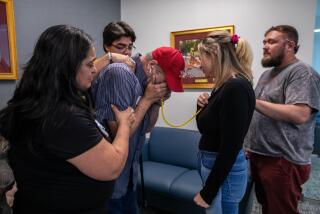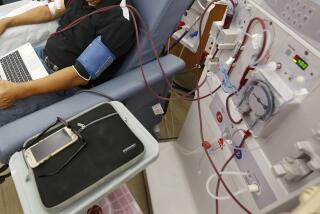Push on for National Organ Swap Program
- Share via
CHICAGO — Kidney transplant specialists pushed Thursday for a national organ swap program that they said could be lifesaving for thousands of ailing patients on waiting lists for transplants.
The swap, done at about 30 U.S. hospitals, would involve patients who need transplants and have relatives or friends willing to donate but whose kidneys aren’t a match. Each patient-donor pair would be matched with another pair to allow reciprocal transplants.
“It’s quite a gift,” said Ron Lazar of North Canton, Ohio, who received a kidney transplant at the Cleveland Clinic in November after his doctors found a couple in the same predicament.
Lazar’s wife, Kathy, had the wrong blood type but her kidney was a match for Debbie Pratt, who like Lazar, had life-threatening kidney disease. And Pratt’s husband, Gary, turned out to be a match for Ron Lazar.
Creating a national “paired kidney exchange” would allow transplants for about half the 6,000 U.S. patients yearly who have willing donors with incompatible kidneys because of different blood types, said Dr. Robert Montgomery, director of Johns Hopkins University’s Comprehensive Transplant Center.
“The payoff is huge,” said Montgomery, who organized a conference in Chicago where dozens of specialists gathered to develop a blueprint for a national paired organ exchange program.
There are more than 60,000 U.S. patients awaiting kidney transplants; 3,718 on the waiting list died last year because suitable organs couldn’t be found in time, according to the National Kidney Foundation.
The average wait is three to four years, and while there are more living than deceased kidney donors, most transplants involve deceased donor organs because two kidneys can be taken from each cadaver. Paired organ exchanges shorten waiting times and provide kidneys from live donors, which are preferred because they improve chances of survival, Montgomery said.
More to Read
Sign up for Essential California
The most important California stories and recommendations in your inbox every morning.
You may occasionally receive promotional content from the Los Angeles Times.













